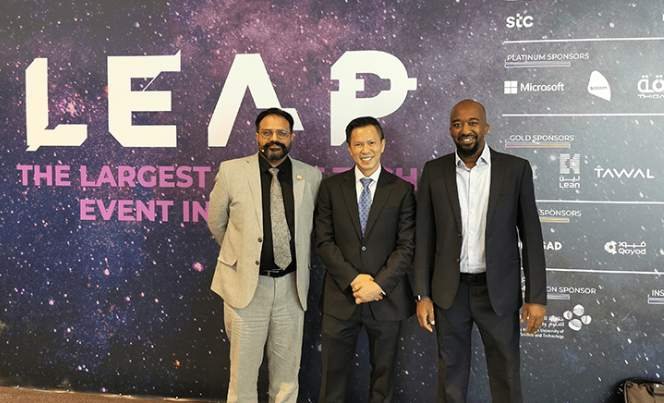Enterprise Blockchain to Transform Construction Industry Known for Inefficiency

According to The Business Research Company, the global construction market reached a value of over $13.5 billion and is expected to grow to almost $23 billion by the year 2026. However, Dr. Maximilian Sinan Korkmaz, managing director at Frankfurt-based construction firm Stabilwerk Bau, says it is the most inefficient industry ever.
Enterprise blockchain can transform the construction industry to become one with the highest efficiency rates, and this is what Dr. Korkmaz discussed as a member of the BSV Blockchain FinTech panel at the first LEAP 2022 tech conference in Riyadh, Saudi Arabia.
No Cash? Pay in Tokens
Throughout his 17 years in construction, Dr. Korkmaz observed that the industry is the least digital and inefficient, with communication issues frequently arising between construction project participants. After dealing with the same problems for years, he decided, “if they are not going to solve these [challenges], I will build a startup and work on them.”
Dr. Korkmaz first heard about Bitcoin while working on his Ph.D. in 2010, but it was not until 2017 that he became interested in it, especially in the BSV blockchain. “I chose Bitcoin SV because the promises were all about industries and applications and businesses; so I thought it was the right one for me,” he remarked.
This is because of BSV Blockchain’s scalability, which is its main selling point for both small and big businesses. What this means is that block sizes and throughput can be scaled unbounded to meet the market’s demands; at the same time lowering its transaction fees to small decimals of a U.S. cent.
At present, BSV Blockchain has already reached a world record of 10 million transactions in a single day at 4GB blocks and a throughput of 50,000 to 100,000 transactions per second (tps). And with fees ranging from 1/20 to 1/100 of a cent; it is the most cost-efficient for businesses needing a massive number of transactions.
BTC Block Significance:
To put it in perspective, BTC has a block size cam of only 1MB and maximum throughput of seven tps at an average fee of $1.29 per transaction, while ETH’s current average throughput is at 21 tps at an average fee of $4.63. When these figures are compared to BSV, it is obvious what the most efficient and practical blockchain is.
And this is the reason why Dr. Korkmaz founded Stabilwerk Bau to be the first to accept BSV blockchain-based credit tokens called Stabilwerk Credits as payment for its services; allowing its clients to pay the business in fiat in exchange for credit tokens.
Stabilwerk Bau intends to deliver an all-in-one construction management system, including smart contract payments. Its Bau.app not only reduces different technical inefficiencies in the sector; but it also supports construction businesses in acquiring the finances they need to perform their tasks.
All contracts involved in this procedure are digitally signed and saved on the BSV blockchain using the app. “With Bau.app, we provide a platform on which participants of construction projects can agree on contracts and run circular construction projects,” Dr. Korkmaz explained. “Payments among them are executed through smart contracts when they are due.”
Dr. Korkmaz believes this payment system is a lifesaver, particularly for small construction businesses that usually struggle with cash flow. Stabilwerk Bau even provides a 10% discount to consumers who pay with tokens for their services; and guarantees that they will be paid immediately after completing the work.
On top of Stabilwerk Bau’s efforts, Tokenized is another company turning to BSV blockchain to offer a contract digital solution that the construction sector could look forward to.
Streamlining Contract Digitization
Tokenized CEO and Co-Founder James Belding said that tokens are ultimately just a subset of smart contracts and a tool that can denote who owns what. His company is an award-winning all-in-one tokenization solution that digitizes contracts for enterprises, government agencies and individuals.
A smart contract uses a software agent to interpret and enforce certain terms and conditions; as well as automate administrative tasks including managing transfer requests; updating ownership registries, enforcing rights, and managing governance proceedings.
This approach results in significant efficiency gains and a better user experience across the lifecycle of the contract; opening a new paradigm in the world of contracting and asset servicing. By comparison, Belding noted smart contracts can unlock a 10x improvement in contracting within the private markets.
“Smart contracts are the digital transformation of contracts such as legal agreements, clauses. There is also a codification element so that you can structure and standardize around certain concepts,” Belding explained. This results in quicker contracting, lower contract risk, and more original insights that were previously unattainable.
Tokenized is using the BSV blockchain as a base layer for all record-keeping and leveraging its time-stamping functionality. “This means you get no political risk at the data layer; there is no jurisdictional risk, and there is no organizational risk,” Belding stated.
Compared to drafting and preparing contracts in a standard Microsoft Word or Excel Spreadsheet; Tokenized aims to take these applications and merge them into a single platform where every piece of data has a single source of truth; giving users access to tools far beyond just a single application.
With Stabilwerk Bau and Tokenized aiming to streamline the construction industry; its inefficiencies would soon be addressed, which may contribute to greater market growth in the future.

